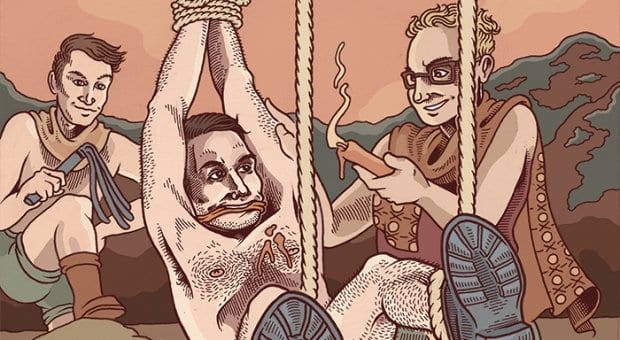I’ve always been aroused by certain forms of objectification. From tying up my GI Joe action figures when I was little, to surreptitiously putting duct tape over my mouth when I was an adolescent, I graduated to being tied up by boyfriends in my late teens. At about 25 I became determined to have the ultimate no-limits experience. Master fastened me to various items in his dungeon — fantastic! — but as he gradually administered pain, I had to quit. That session helped me further define my limits: I am uninterested in pain apart from the occasional slap. Clearly, I’m not the man TE Lawrence was.
TE Lawrence, better known as Lawrence of Arabia, distinguished himself as a liaison officer between the British Army and the Arab Northern Army in the First World War. His job was to foster rebellion among the Arabs against the Ottoman Turks, which involved guerrilla operations alongside Prince Faisal. While working as an archaeologist in the Middle East before the war, Lawrence developed an affinity for the Arab people. He was so devastated when the 1919 Paris Peace Conference did not result in a self-governed Arab state, he refused a medal from King George V.
Lawrence’s fame was assured in 1920 when an American journalist exhibited photos of the war under the title With Allenby in Palestine and Lawrence in Arabia. Lawrence’s celebrity reached new heights when he published an account of his time in Arabia called Seven Pillars of Wisdom. Many will be familiar with Peter O’Toole’s 1962 portrayal of Lawrence in the Oscar-winning film Lawrence of Arabia or the 2012 film Prometheus, in which the android David (played by Michael Fassbender) watches the 1962 film repeatedly in order to copy O’Toole’s mannerisms.
There is disagreement over whether Lawrence was gay. However, Seven Pillars of Wisdom contains some undoubtedly homoerotic statements. In one passage, Lawrence describes “friends quivering together in the yielding sand with intimate hot limbs in supreme embrace.” He dedicated the book to “SA,” who may have been a certain Syrian boy, and included a poem with these lines: “I loved you, so I drew these tides of men into my hands; and wrote my will across the sky in stars; To earn you freedom, the seven-pillared worthy house; that your eyes might be shining for me; When we came.”
Clearly I wasn’t a liaison officer during the First World War, and I haven’t been portrayed by Peter O’Toole (yet). My claim that I’m not the man Lawrence was refers to something a lot more exciting: his love of being whipped. He may not have been gay, but many agree he had a penchant for male-administered whippings. After the war, he attended spanking parties in Chelsea held by a German named Jack Bilbo. Lawrence would also pay military colleagues to beat him or force him to endure physical hardship, like intense swimming or running. Many biographers link these desires to his being captured during the war, tortured and gang-raped by Ottoman-Turk guardsmen, an experience Lawrence described masochistically: “delicious warmth, probably sexual, was swelling through me.”
One of his taskmasters was the young Scotsman John Bruce, whom he paid to beat him for many years, after allegedly creating an elaborate set of lies to bring these sessions to life. Supposedly, Lawrence invented a fake uncle, “R” or sometimes “Old Man,” and would write to Bruce as this person, giving instructions on how to beat Lawrence. Later, “R” would write to ask how it had gone or to provide instructions for the future: “unless he strips, the birch is quite ineffective. The twigs are so light that even the thinnest clothing prevents their hurting.” Good lord! Years of maintaining a fake persona just to get off is way beyond my limits for pain.
(History Boys appears on Daily Xtra on the first and third Tuesday of every month. You can
also follow them on Facebook.)


 Why you can trust Xtra
Why you can trust Xtra


